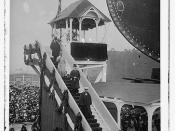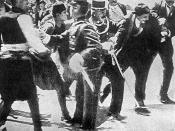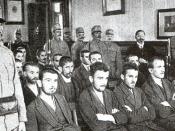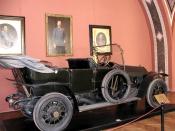There are many origins of the First World War. For this essay I will cover just two or three of them. An important factor leading up to the First World War was the assassination of the Archduke Franz Ferdinand. The archduke and his wife Sophie were assassinated by Gavrilo Princip, a Serbian, on the 28th June 1914. This appeared to be a catalyst to the war.
Archduke Franz Ferdinand was the heir to the Austrian throne. The Austrian - Hungarians retaliated against the Serbian people. Because of an alliance that Germany had with Austro-Hungary they said they would support them in a war. Russia was in alliance with Serbia and they said they would support them in a war. Italy had an alliance with Germany and Austria-Hungary and this was called the triple alliance. Germany said they would declare war on Russia if they did not back down. France had an alliance with Russia, and they agreed to back them in a war - this was called a dual entente.
Then later when Britain joined in it became the triple entente.
Britain did not join in with the war straight away this was partly because it only had verbal alliances and also they were trying to negotiate with the warring countries and act as mediators. Finally when Germany declared war on France and invaded through Belgium, Britain declared war on Germany. Belgium was a neutral country and Britain came to its aid (like protecting the underdogs). Italy changed sides and joined the Russian, France and Britain side.
Although originally the alliances were set up as protection the alliances also caused the nations to war not just the two countries that were in disagreement. The details of the alliances were kept secret and have only now been released. Just knowing a country was in alliance was enough, the details were not needed. Feelings were very important such as the Austria Hungary alliance with Germany -this united the countries and they felt secure. The Marxist historian Joll believed that the secrecy and diplomats caused the breakdown of the alliances and ultimately the war.
Ideologies were very important. It was as important what people thought had happened as what had actually happened. Weltpolitik was a way of thinking. It means 'attitude of mindâ¦I.Giess believed that the Kaiser had the perfect attitude and personality for Welpolitik, 'bore the personal stamp of the Kaiser'. The Kaiser was paranoid and a meglomanic. Panic and fear also played an important part to Ideologies. Propaganda was rife and people believe what they were told and what they read and saw. The press played a major part in this. There was a rise generally in media culture. There was mass production of pamphlets and manipulation of data. Posters were put up and freedom of the press meant they could print what they wanted. Letters were censored before they could be sent home so that families back home didn't know how bad it was in the war. Attitudes were very important and what people thought.
The naval race is another example of this. Germany had the best land army - and the second best navy. Britain's was the best. Germany however wanted to be the best and it concentrated its efforts into making its navy the best. They could only speculate what Britain had in the navy and Admiral Von Turpitz told Germany they must at least double the number they thought that Britain had. The Germans had U-boats and submarines but they wanted more and began to build dreadnoughts like the British had already.
Sir Edward Grey realised that Britain had to keep on building ships and military armaments even though as he said 'he didn't agree in spending revenues on naval and military preparation to kill each other'. He also said 'we must be prepared to defend our national existence'.
Britain had the man-power, knowledge and innovators they also had the area and facilities to build the ships. Britain was responsible for policing colonies and trade routes. They defended the coastlines and imposed blockades. England and France had a naval agreement that they maintained the security of the English channel and France the Mediterranean.
BibliographyThe Origins for World War One, 1871-1914by Joachim RemakThe Origins of the First World War (Origins Of Modern Wars) by James Joll and Gordon Martel





